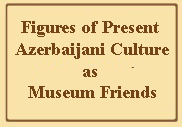26 April 2024
Khuraman Kasimova
Kasimova Khuraman Ekrem gizi (6 June 1951, Baku) - famous Azerbaijani opera soprano singer was born in Baku in an intelligent family. She received general secondary education at school №23 named after A.S.Pushkin. From her childhood she loved to sing. In 1970 she entered the vocal faculty of the performing department of the Uzeyir Hajibeyov State Conservatoire in the class of the outstanding Azerbaijani singer, Professor Shovket Mammadova. After her death Khuraman continued her studies in the class of Associate Professor Ida Aronovna Lvovich. Having successfully completed her studies at the Conservatory, in 1976 she was employed in the opera group of the Azerbaijan State Academic Opera and Ballet Theatre named after M.F.Akhundov. Being still a schoolgirl Khuraman Qasimova in the mid-60s, starred in the main roles in three feature films of "Azerbaijanfilm" film studio named after Jafar Jabbarli: The Service Elevator, I Was Not Beautiful, Life Tests Us. In 1969 at the All-Union Film Festival Prometheus 69 held in Kharkov, Ukraine, young Khuraman was awarded a diploma of the first degree for the best performance of the female role of Saida in the film I Was Not Beautiful.
Having come to the opera theatre, with certain acting skills she very quickly began to enter the repertoire. Her first roles were Salma in Mamed Kuliyev's opera The Deceived Stars, then the main role of Khanum in Jahangir Jahangirov's opera The Fate of a Singer. Then she performed the main role of Jirtdan in Nazim Aliverdibekov's children's opera Jirtdan, in which she vividly showed her artistic abilities in the image of a nimble boy Jirtdan.
In the winter of 1977 Khuraman was a participant of the IV traditionally Transcaucasian contest of musicians-performers and in the nomination of solo singing was awarded the first prize and the title of laureate.
In autumn 1977 she became a laureate of the VIII All-Union competition of vocalists named after M.I.Glinka, held in the city of Tashkent. The won awards and creative successes inspired her for new daring. So Khuraman Kasimova in 1981 at the traditional international competition of vocalists named after "Maria Callas" received the first prize, and also was honoured with the highest award of the competition, Grand Prix - a gold medal. The prize was presented to her by the president of the jury, the great singer of the 20th century, Tito Gobbi.
The competition was held in Athens, the capital of Greece. She was the first young singer in the Soviet Union to win the Maria Callas Competition. Such a high achievement gave her even more self-confidence. So in 1982 Huraman decided to take part in the most prestigious Tchaikovsky Competition. Tchaikovsky Competition. Having passed three rounds, she won an honourable second place, received a silver medal, and was awarded the title of laureate of the VII International Tchaikovsky Competition in the category of Solo Singing. Today she is the only Azerbaijani performer who has become a laureate of such a prestigious international competition.
In July 1982 Khuraman Kasimova was awarded the honourable title of Honoured Artist of Azerbaijan. These honours and titles brought her great popularity in the country. She began to go on tour frequently. Her successful performances were applauded in Moscow, St Petersburg, Austria, England, USA, Yugoslavia, Greece. Malta, Sicily, Spain, etc. On the stage of the opera theatre she created many unforgettable images of these: Mimi and Musetta in G. Puccini's opera La Bohème, Tatiana in Tchaikovsky's opera Eugene Onegin, Desdemona in G. Verdi's opera Otello, Tosca in G. Puccini's opera Tosca, Aida in G. Verdi's opera Aida, Sevil and Dilber in F. Amirov's opera Sevil, Nargiz in M. Magomayev's opera Nargiz, Natavan in V. Adigezalov's opera Natavan and many others.
Since 1982, Khuraman Qasimova began to combine her creative activity with pedagogical activity and started working at the Vocal Department of the Azerbaijan State Conservatory.
In 1984 she was honoured with the title of the laureate of the State Prize of Azerbaijan for her successful concert and chamber activity.
In 1986 Khuraman Kasimova was awarded the honourable title of People's Artist of Azerabayjan. The range of the singer's concert-chamber repertoire is vast, including works by Western European authors and Russian musical classics. A special place in her creative work is taken by the performance and promotion of works of Azerbaijani composers and uniquely beautiful folk songs of Azerbaijan.
Since 1994 till present she has been the head of the chair of "Solo Singing" at Baku Music Academy named after Uzeyir Hajibeyli.
In 1996 she was awarded the title of professor.
From 1994 to 1997 Khuraman Kasimova worked as a contract professor at the Conservatory of Istanbul University, where she raised many young singers for brotherly Turkey.
Today dozens of Khuraman Qasimova's pupils successfully perform on opera and concert stages not only in our country, but also far beyond its borders.
The leadership of Azerbaijan highly appreciated the merits of Khuraman Qasimova. In 2001, by the decree of Azerbaijan's national leader President Heydar Aliyev, Khuraman Qasimova was awarded the Order of Glory (Şöhrət) for her great creative achievements in the field of vocal art. In 2011, by the decree of President of the Republic of Azerbaijan Ilham Aliyev, Khuraman Qasimova was awarded the Order of Honour ("Şərəf") for her great contribution to the development of musical culture and art of the country. On 5 June 2021, President Ilham Aliyev signed a decree on awarding Khuraman Ekrem gizi Qasimova the Order of Independence (İstiqlal) for her long-term and productive activity for the development of Azerbaijani culture and art.
 back to news back to news
|



|












